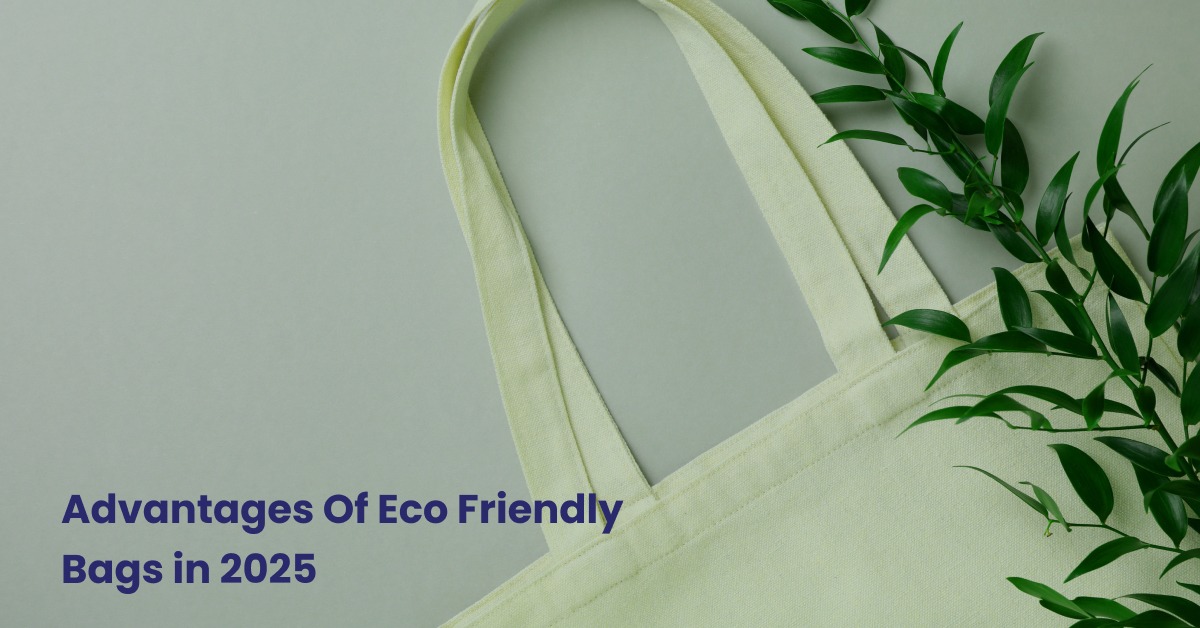In 2025, pollution continues to pose a significant environmental challenge. Annually, an estimated 19 to 23 million tonnes of non-degradable waste contaminate aquatic ecosystems, polluting lakes, rivers, and seas, harming wildlife, and disrupting natural habitats.
Eco-friendly bags offer a sustainable solution to this pressing issue. They are reusable, biodegradable, and crafted from natural materials. In 2025, adopting eco-friendly bags is more crucial than ever.
As environmentalist Robert Swan aptly stated, “The greatest threat to our planet is the belief that someone else will save it.”
By choosing eco-friendly bags, we take proactive steps toward a greener planet.
What Are Eco-Friendly Bags?
Eco-friendly bags are reusable bags made from sustainable and eco-friendly materials. Unlike conventional bags, they do not contribute to pollution. These bags are designed to be strong, durable, and environmentally safe.
The main purpose of eco-friendly bags is to reduce waste and promote sustainability. They come in different shapes and sizes, making them a great alternative to single-use non-degradable bags. With growing awareness, many businesses and individuals are switching to eco-friendly options.
Types of Eco-Friendly Bags
There are different types of eco-friendly bags, each with unique features. Some are made from natural fibres, while others use recycled materials. Here are the most common types:
- Cotton Bags – Made from natural cotton, they are soft, durable, and washable.
- Jute Bags – Strong and biodegradable, perfect for shopping and everyday use.
- Canvas Bags – Made from thick fabric, great for carrying heavy items.
- Hemp Bags – Eco-friendly and durable, known for their strength.
- Paper Bags – Recyclable and biodegradable, ideal for carrying lightweight products.
- Biodegradable Bags – Break down naturally without harming the environment.
- Non-Woven Bags – Lightweight, reusable, and commonly used for grocery shopping.
Each type of eco-friendly bag helps in reducing solid waste and protecting the environment.
Top 10 Advantages of Eco-Friendly Bags
Switching to eco-friendly bags offers many benefits. Here are the top 10 advantages of eco-friendly bags:
1. Reduces Non-degradable Waste
Non-degradable bags take hundreds of years to decompose. Eco-friendly bags help reduce the use of non-degradable materials, preventing pollution. They are a sustainable alternative that minimizes environmental damage.
2. Biodegradable and Recyclable
Many eco-friendly bags are biodegradable. This means they break down naturally without harming the soil or water. Some are also recyclable, making them an excellent choice for sustainability.
3. Durable and Reusable
Compared to non-degradable bags that tear easily, eco-friendly bags offer superior strength and longevity.
4. Made from Sustainable Materials
Eco-friendly bag materials include cotton, jute, hemp, and recycled fabric. These materials are renewable and do not harm the environment. Choosing these bags promotes sustainable living.
5. Reduces Carbon Footprint
The production of non-degradable bags releases harmful gases into the air. Eco-friendly bag making requires less energy and emits fewer greenhouse gases. This helps in reducing the overall carbon footprint.
6. Safer for Wildlife and Marine Life
Non-degradable bags pose a significant threat to wildlife, particularly marine life. Animals often mistake them for food, leading to fatal consequences. Eco-friendly bags mitigate this risk by reducing non-degradable pollution.
7. Stylish and Customizable
Eco-friendly bags come in various designs, colours, and sizes. Many businesses use them for branding and promotions. They are stylish and can be customized with logos or messages.
8. Cost-Effective in the Long Run
While eco-friendly bags may have a higher initial cost, their reusability provides long-term savings, as you don’t need to buy disposable bags frequently. Many stores also offer discounts for using reusable bags.
9. Encourages a Green Lifestyle
Using eco-friendly bags is a small step towards an eco-conscious lifestyle. It encourages individuals to make better choices for the environment. When more people adopt sustainable habits, it leads to a positive impact.
10. Supports Government Regulations and Policies
Many governments worldwide are banning single-use non-degradable bags. Using eco-friendly bags aligns with these regulations. It also helps businesses comply with environmental policies.
Related Blog: The Future of Sustainability: Top Trends to Watch in 2025
How to Choose the Right Eco-Friendly Bag?
Choosing the right eco-friendly bag depends on your needs. Here are some key factors to consider:
- Material – Choose bags made from natural or recycled materials. Cotton, jute, and hemp are great options.
- Durability – For a strong and durable option, choose canvas or jute bags, ideal for carrying heavy loads.
- Purpose – Non-woven or cotton bags are excellent for groceries, while canvas or jute bags are well-suited for daily use.
- Eco-Friendliness – Prioritize biodegradable or recyclable options and avoid bags treated with harmful chemicals.
- Customization – If you need promotional bags, choose ones that allow printing or branding.
By choosing the right eco-friendly bag, you contribute to a healthier planet.
FAQs About Advantages of Eco-Friendly Bags
Q1. How do eco-friendly bags help the environment?
Eco-friendly bags reduce non-degradable pollution and waste. They are biodegradable, reusable, and made from sustainable materials. This helps protect nature, wildlife, and marine life.
Q2. What materials are used in eco-friendly bags?
Eco-friendly bag materials include cotton, jute, canvas, hemp, paper, and recycled non-degradable material. These materials are renewable, biodegradable, and environmentally safe.
Q3. Can I wash and reuse eco-friendly bags?
Yes, most eco-friendly bags are washable and reusable. Cotton and canvas bags can be easily washed, while jute bags need gentle cleaning. Proper care extends their lifespan.
Q4. Can eco-friendly bags be recycled?
Yes, many eco-friendly bags are recyclable. Paper bags and certain types of cloth bags can be recycled easily. Recycled bags also help in reducing waste.
Q5. Are eco-friendly bags regulated by government policies?
Yes, many governments have banned non-degradable bags and promote eco-friendly alternatives. Regulations encourage businesses and individuals to use sustainable bags.
Conclusion
Eco-friendly bags are an essential step toward a cleaner and greener future. They help reduce pollution, save resources, and promote sustainability. By using eco-friendly bags, you contribute to protecting the planet.
The benefits of eco-friendly bags are undeniable, “durability, reusability, and biodegradability”. Transitioning to these bags offers advantages for both individuals and businesses. Embrace the change now.
Make a Sustainable Choice with Prabhu Naidu Ltd – Switch to Eco-Friendly Bags Today!
At Prabhu Naidu Ltd, we are committed to sustainability. Our high-quality eco-friendly bags are designed for durability and style. Whether for shopping or business use, our bags are the perfect alternative to non-degradable materials.
Join us in making a difference. Choose Prabhu Naidu Ltd.’s eco-friendly bags and take a step toward a greener future. Start shopping today!


